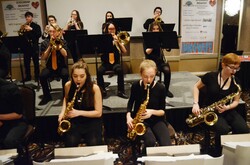Inaugural scholarship breakfast features keynote speaker Vik Maraj

By Garrett Simmons
Lethbridge School District No. 51
Communications Officer
Lethbridge School District No. 51’s inaugural Scholarship Breakfast on Valentine’s Day was a huge success.
The event, designed to raise funds for the Canada 150 ICE Awards - four new innovation scholarships geared towards District high school students, featured keynote speaker Vik Maraj.
An internationally-renowned speaker, Maraj spoke about three keys for creating innovation.
“The first thing is letting go of what you already know,” said Maraj, who told the audience humans typically fight to hold on to what they know, which often limits what they can achieve.
To illustrate his point, he told the story of NASA’s journey to the moon, which started out with an idea for basically a modified aircraft, capable of space travel. However, it was only until the team looked at the problem from a different perspective, did any progress begin.
“They realized at some point, everything they knew was a prison to fulfilling Kennedy’s mandate,” said Maraj, who added scientists had to break out of a particular mental model to achieve their goal.
NASA scientists decided to flip the scrip and worked backwards, as they envisioned themselves with a spacecraft already on the moon. From there, an exercise in “metal gymnastics” was undertaken to reverse engineer how that small object landed on the moon.
The idea of a rocket, with components that were released in stages, eventually won the day, as NASA did achieve Kennedy’s vision.
“Innovation is literally a function of letting go of what you already know,” said Maraj, who added that doesn’t mean knowledge isn’t important, but people need to learn to manage that knowledge, and not allow knowledge to manage them.
People often pull towards what they know, however, as Maraj stated while innovation is certainly valued, change is difficult.
“If people don’t deal with how they think, it’s ultimately very limiting. No problem is going to get solved from the level of consciousness with which it was created.”
Communication is the second key, Maraj told the breakfast audience.
“Innovation comes from conversation,” said Maraj, who added the vast majority of the world’s top companies are in fact partnerships.
And while people value independence, a shift towards inter-dependence is what makes these partnerships flourish.
“Very few people break through to the stage of inter-dependence” said Maraj, who stressed the importance of collaboration. “You and I aren’t going to really get anything done in this world by ourselves. If you are going to make a difference, you need others. Innovation cannot happen inside a vacuum of communication.”
Involving others and expanding the conversation allows others to contribute their talents towards great ideas, according to Maraj, as he transitioned to the third key to innovation – dealing with failure.
“You have to have a high tolerance for failure,” he said, as often times, the concepts of critical thinking and skepticism can have a negative impact on innovation. “New ideas often get shut down in a skeptical environment.”
Maraj added a culture of fear, and being conditioned to be skeptical and to mitigate risks, are enemies of innovation.
“With this kind of context of an environment of ‘don’t stick your head out,’ there is a very poor resilience to failure,” said Maraj, who mentioned many of the world’s top companies actually reward employees for risk-taking initiatives. “If you’re not willing to fail, there is no innovation. There is no real failure – failure is an interpretation. Most people are stopped not by what happened, but by what they make it mean.”
People need to simply reset after failure, instead of dramatizing the event, as he added today’s youth need to deal with the backlash their innovative thinking will create, and in turn, develop a deep respect for inquiry.
The scholarship breakfast, which featured a Valentine’s Day theme, also included displays of innovation from the District’s five high schools, a robotics presentation and performances from the Lethbridge Collegiate Institute Jazz Band.
Maraj also spoke later in the morning to students at Chinook High School.











